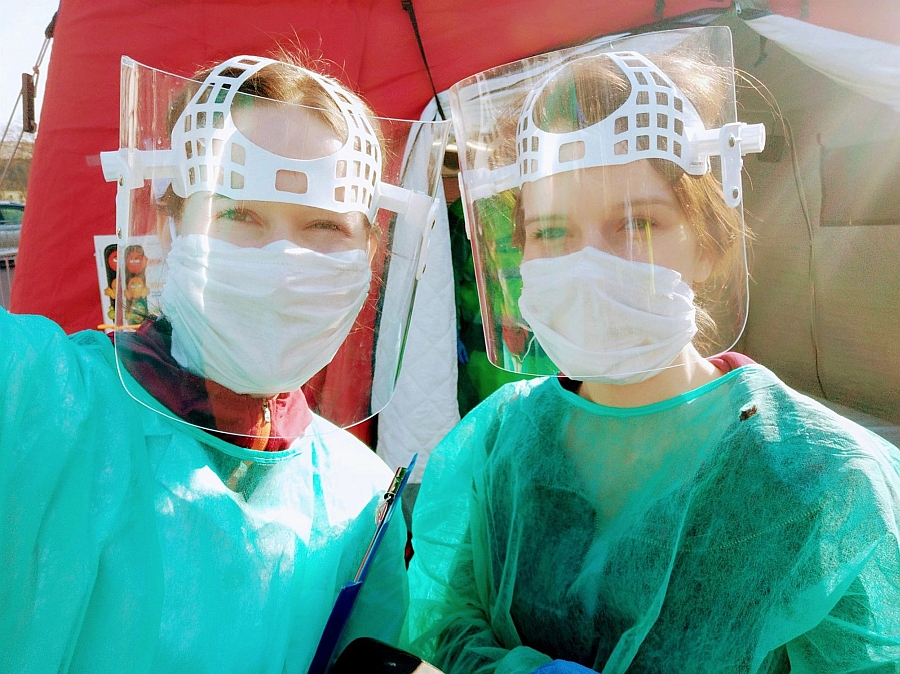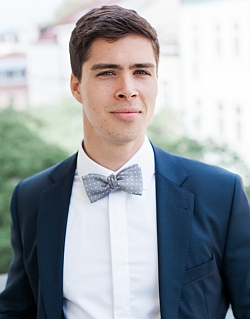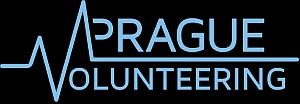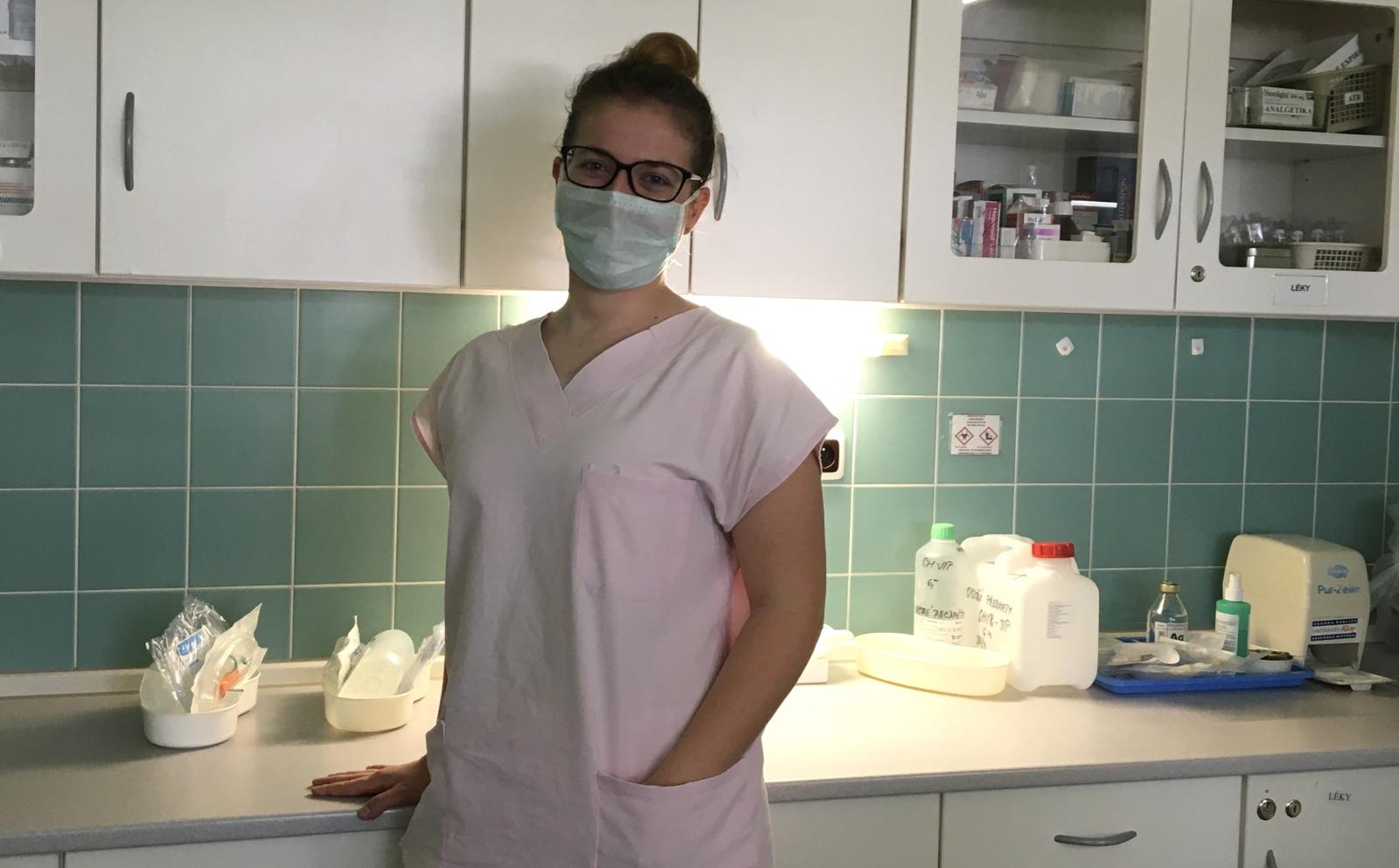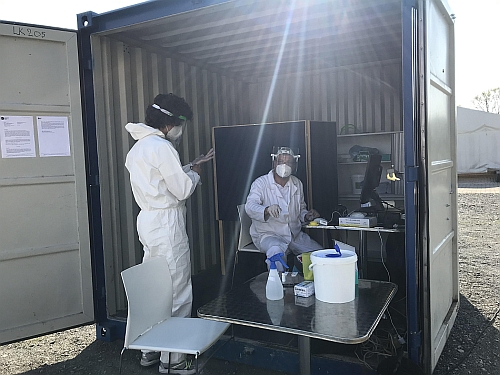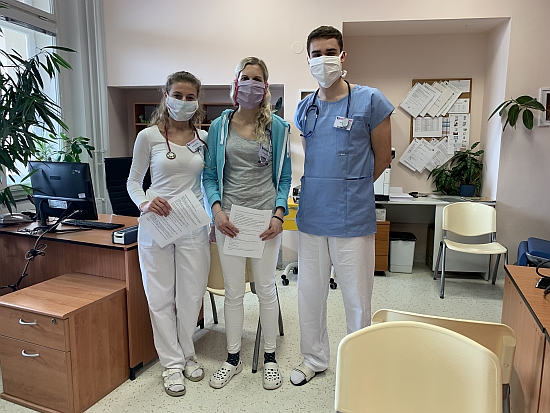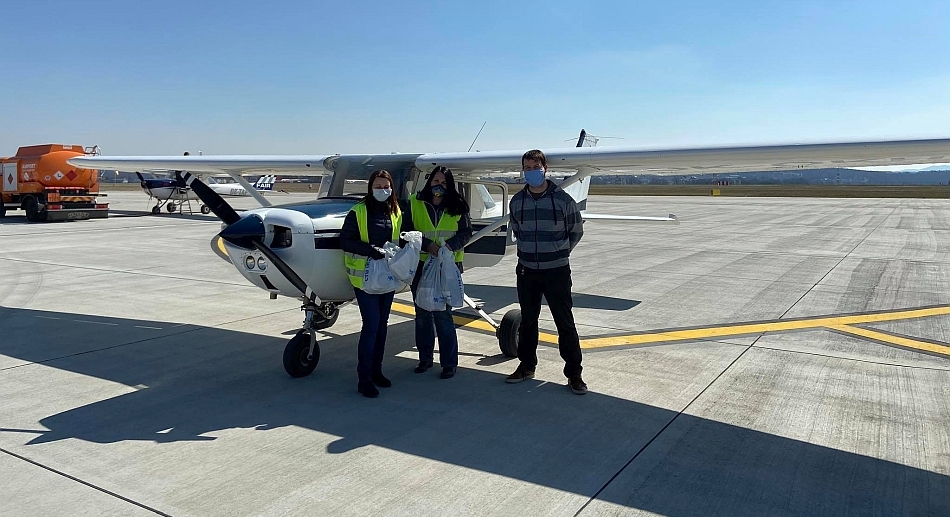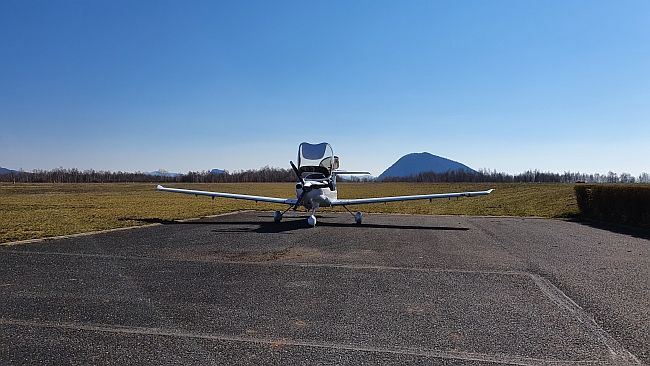From students on the front lines to pilots delivering medical supplies
The COVID-19 pandemic has brought out large numbers of volunteers across the country, offering help in a time of unprecedented crisis. Many offer skills as medical students, others sew the much-needed masks that have been required ever since the country went into lockdown. Still others volunteer to work as drivers and even pilots have joined in an online initiative to deliver medical equipment across the country where needed.
FROM MEDICAL STUDENTS TO EXPATS
At Charles University, med students got involved early on when the first cases began to appear. Not long into the crisis we spoke to organiser David Kulišiak from the First Faculty of Medicine whose interview you can read in the Forum archives. Students at the First Faculty were not alone: Vitaly Fetissov is a student in his sixth year at the Third Faculty of Medicine. Offering to help organise foreign medical students, the Moldova-born American founded Prague Volunteering, which he soon expanded to include the broader expat community. He explains how the situation came together:
When the government put out the call for fifth and sixth year medical students to help, there needed to be an organisational team to put students in places where they were needed. That was directly organised by the Charles University medical faculties and primarily within the Czech curriculum. I offered to help with English-speaking students. But after about a week I realised that even though the faculty’s scope is pretty large with many students, there was a possibility to expand to the larger expat community. So I took it and made it independent; it seemed like the logical next step in the chain.
Volunteers signing up at the website are directed to areas where they can best help. Medical students fit within the broader faculty organisation.
We have forms that are specific for the school and jobs that are specific for medical students that they are entitled to do and citizen volunteers cannot.
Medical students can volunteer and help in making masks, running a help line (most often taking calls from people who are displaying symptoms and are worried what to do next), doing research, or helping in clinical work. Citizen volunteers can also help in making masks or collecting fabric or in other ways still under expansion. Small businesses have also gotten involved, providing support that also makes a difference: one donates fresh-brewed coffee to help volunteers get through the day. Vitaly Fetissov says the amount of interest has been nothing short of great:
I did not expect so many people would join and with so much enthusiasm. Many people really wanted to get involved. Just on the ground level, with the way things are going in the Czech Republic, our work is actually slowing down a little bit: it’s still early to say, but the crisis here seems to be a little under control. That said, we are continuing all our activities – including research and compiling information on the virus - and staffing the helpline.
The help from professional sectors was also most welcome:
The donated coffee shows the specific kind of drive and mentality that I really respect. Many others have contacted us who want to help on a larger scale, and we had help from graphic designers who helped us create a more aesthetically pleasing website. It has really made a difference.
There is no question that the pandemic - as it spread in Europe – brought out the best in many and has brought many people together; Vitaly says whether one is a med student helping in the front lines or someone working from home, it is inspiring how many people chose to get involved.
This is an historic crisis, one that our professor on infectious diseases says we as medical students are lucky to witness in real time; that is not to say that it is a good thing but it does provide us with the valuable insight into this kind of virus in real time as opposed to historical records and past analysis.
Will the world change? I think it already has: I am seeing more comradery between people, more teamwork, people are starting to take a more human outlook instead of just thinking about themselves. When all this is over, people are going to realise that the work that they did that mattered the most was what they did for others, not for themselves.
THE FRONT LINES
Clara Boettcher Mallmann is a fellow volunteer and second-year med student from Brazil responsible for public outreach at Prague Volunteering. She told Forum how she got involved:
I originally got in touch and asked Vitaly if he could help me with a video for my hometown in Brazil because I had been so amazed with what he had done. I wanted to provide people in my hometown with info about how to set up a similar initiative there. And from him I learned that he still needed more organisers in the project here to help with the website and organising duties. So I came in about four days after they began. They were very busy and there was lots to be done.
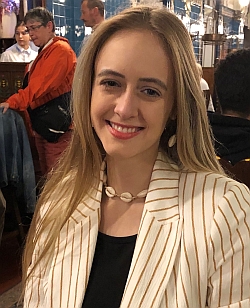 Boettcher Mallmann suffers from asthma so has been working from home as opposed to being on the front lines. She says that balancing work and distance learning has worked and is now on track, even if it was confusing at first. Now she balances her time between distance learning, reading study materials, and doing volunteer work according to a daily schedule. Meanwhile, she has been hearing back from students in the field:
Boettcher Mallmann suffers from asthma so has been working from home as opposed to being on the front lines. She says that balancing work and distance learning has worked and is now on track, even if it was confusing at first. Now she balances her time between distance learning, reading study materials, and doing volunteer work according to a daily schedule. Meanwhile, she has been hearing back from students in the field:
I have some friends in the third year who have been in the very front line: most of the hospitals have tents before the hospitals themselves where they do a triage, checking temperatures and so on, so that they check people outside so they don’t continue into the facility and raise the risk of infection. One friend has been collecting data for the National Health Institute every day from 8 am to 5 pm. The thing that I hear the most is that it is an exhausting job but everyone is glad to be involved. It also helps that things seem to be working in the Czech Republic as well.
Clara Boettcher Mallmann is concerned about how the situation is developing at home: but she says how things unfold in Brazil may be different. Steps that appear to have largely worked in the Czech Republic, with the early lockdown, masks and social distancing, will be more difficult or even impossible to implement there for social, economic and demographic reasons. Brazil is also a country of more than 210 million people compared to the Czech Republic’s 10.6 million.
They are still behind the Czech Republic in terms of the peak. Sao Paolo I heard was already 90 percent capacity in terms of hospitals, so I fear we are going to hear bad news about Brazil in the coming days: I am afraid it will get worse before it gets better.
Boettcher Mallmann, like Vitaly Fetissov, nevertheless says it is inspiring that so many people are willing to help in the face of crisis, to try and do their part. She says it is an indication the future may be brighter, once the crisis is over. With many of us thinking more collectively, I think this pandemic will change the way humanity moves forward, in a way that was needed.
(the article continues below)
|
SOME OF THE MANY PLACES WHERE THIRD FACULTY STUDENTS ARE HELPING - A CLOSER LOOK
Lukáš Kaňka, a student from the Third Medical Faculty, has become the first member of the healthcare team at Vítězné náměstí (in Dejvice in Prague 6) which provides new testing of patients with a risk COVID-19 positivity!
Recently, special sites for testing patients using rapidtests for detecting antibodies against COVID-19 have been created under the aegis of the Ministry of Health. In case of the test positivity, the patients are sent to follow-up with a PCR test, whereas if the test for both categories of antibodies is negative, the general practitioner can decide to end the patient’s quarantine.
The testing itself takes place outside of the practitioners’ offices in specially equipped booths in order to minimize the contact of potentially infected people with other patients and to save protective equipment.
Students are also helping at The Institute for the Care of Mother and Child. Currently almost 30 med students from the Third Faculty of Medicine are working there on various positions regarding not only triage, but helping at individual departments as well. Jakub Heřman, a volunteer from the Third Faculty of Medicine, told us about his up to now experience at the prenatal ambulance: “We are well aware that we are not able to fully substitute the work of nurses and midwives, however, the staff of The Institute for the Care of Mother and Child is training us so that we can be as helpful as possible in case the staff crisis worsens. Our work consists of taking history, measuring blood pressure of pregnant patients who come for regular prenatal check-ups, and CTG monitoring. We also provide administrative support which allows the midwives to do other work which is now much more important.”
- written by Veronika Viktoria Matraszek, 3rd year student at the Third Faculty of Medicine
|
(cont'd)
THE SKY'S THE LIMIT
The mix of students and citizen volunteers involved in Prague Volunteering at Charles University is inspiring and shows how well schools and the broader public intersect to help; it is not alone. Another initiative, that has made international headlines, also brought universities and members of the public together called pilotilidem. Like students, an extensive number of private pilots offered their help early on in the crisis to deliver medical equipment and other supplies around the country. One example is the delivery of 3D printed masks designed by covmask.cz connected with the Czech Technical University (ČVUT).
Tomáš Cáp, a pilot and one of the members of the organisational team, told Forum it began with a facebook post, where an online group member floated the idea of using private planes. The idea caught on almost immediately: within days there were hundreds of volunteers coming forward who were willing to fly, covering most - if not all - of the costs themselves.
It all started with a single facebook post. It was an aviation-related group. Our founding member, Miloslav Chlan, asked if anybody had thought about using private planes to deliver medical goods and Adam Zahradníček replied. Together they built a website and began assembling a team.
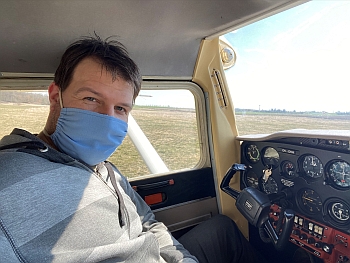 Cáp says that pilots come from different backgrounds, some of them are former airline pilots or former military, while others are recreational. All of them share one thing in common:
Cáp says that pilots come from different backgrounds, some of them are former airline pilots or former military, while others are recreational. All of them share one thing in common:
What we share is that – under normal circumstances - most of the time we fly for fun.
The love for flying, in this case, provided a bigger opportunity: to do something to make a difference – to not be grounded at home, but to help. The response was significant.
We now have almost 400 pilots, some former airline pilots, some former military, a few who are still professional, and others who are recreational. We fly Cesnas, Pipers, usually two- or four-seaters or ultralights. I think many of us were thinking about doing something like this, you know, taking the plane and flying… but it always takes that special individual who gets things in motion for it to happen.
So when those two guys published the initial challenge, it got a response from pilots across the country. So we began and have been delivering supplies for example from Prague to Most, to Ostrava, wherever they are needed.
Jan Bradáč is a private pilot who got involved and flew with 3D printed masks from the Czech Technical University to the ARO section of a hospital in Most and also volunteers in dispatching for pilotilidem. A well-known figure in the Czech film industry, he says he is glad he could get involved:
Everything these days has become more personal. Because there is not anyone who in some way was not touched by the crisis so my feeling is if I can do something, I will. Here you have a bunch of guys and girls who come from different parts of the country and most of us have never even met face-to-face.
Everything is being done through electronic media: we have a person from the railways, another who is a teacher, some are younger while some are a little older like me (laughs). It’s great to watch something like this come together, something I could never imagine, and I am proud to be a part of it. I didn’t forget my job of course (laughs) and I hope that a return to business is really not that far into the future; but of course the health situation takes precedence.
Beginning this week, the Czech government has eased some restrictions in place preparing both to implement a nationwide smart quarantine (to use contact tracing and testing) and will introduce steps to slowly reopen businesses as well as other workplaces.
Some measures – the requirement of masks and social distancing are likely to remain in place for longer – perhaps the course of the summer. Questions over how long the country’s borders will remain closed to most is up in the air for the time being: no doubt there are plenty of divergent and downright opposing views on how quickly to reopen the country in the effort to restart the economy and return life “back to normal”. There are questions if that is even possible or if there will be a new “normal” but this is a positive: the overall number of COVID-19 cases in the country remains low as well as the number of fatalities.
No one knows what the future will bring but if there is a “silver lining”, it is this: that so many people have come out to help. Taking inspiration from each other in both the public and private sector. Individuals can come together and the one thing almost everyone says in this period, in this time, is that they hope this spirit will continue. Even after the crisis has passed.


